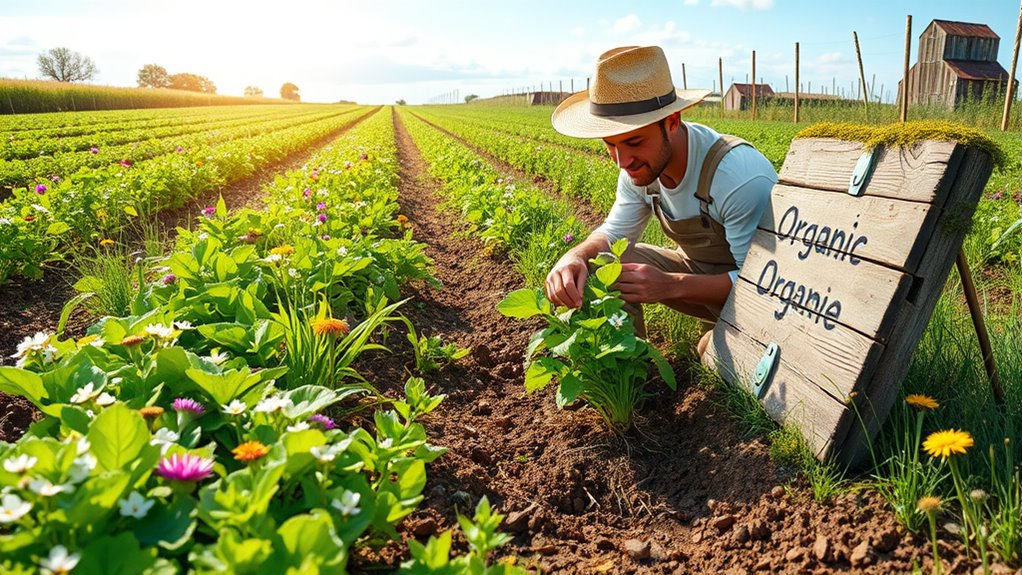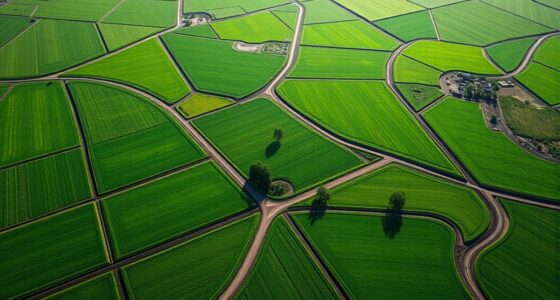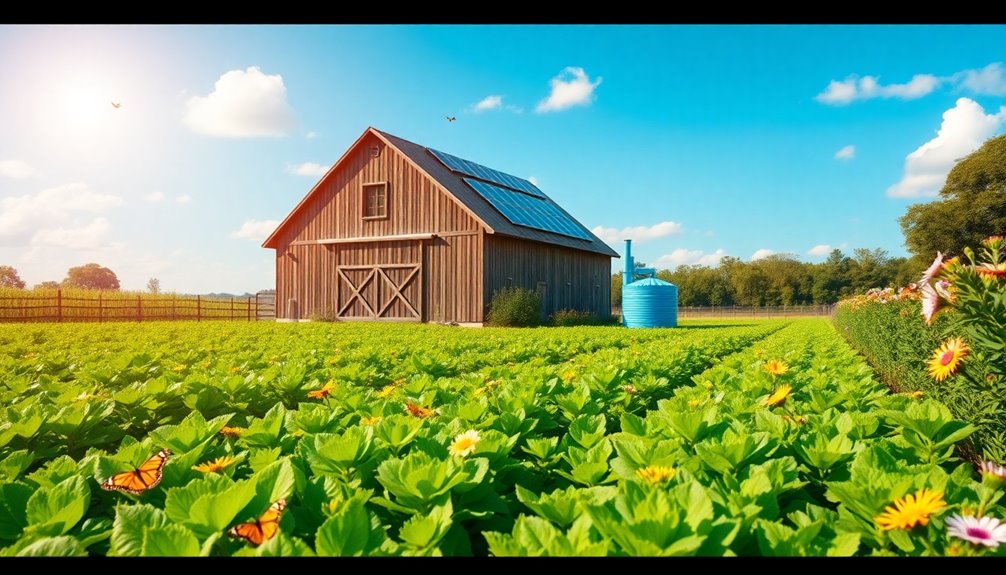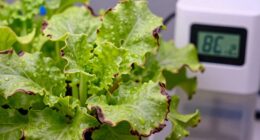Organic farming is a sustainable agricultural method that focuses on using natural inputs while avoiding synthetic chemicals and GMOs. It prioritizes the health of ecosystems, promotes biodiversity, and fosters environmental balance. This innovative approach involves practices like crop rotation, natural pest control, and organic fertilizers to maintain soil health and support diverse farming systems. If you're curious about the principles, methods, and benefits of organic farming, there's much more to explore.
Key Takeaways
- Organic farming is an innovative agricultural system that prioritizes natural inputs and bans synthetic chemicals, GMOs, and growth hormones.
- It emphasizes environmental health and biodiversity, focusing on sustainable practices that nurture living systems.
- Organic farming requires a rigorous certification process with strict standards and regular audits to ensure compliance.
- Methods include crop rotation, composting, biological pest control, and using organic fertilizers and seeds.
- The economic benefits include premium pricing for organic produce and reduced reliance on costly inputs, promoting financial stability.
Definition of Organic Farming
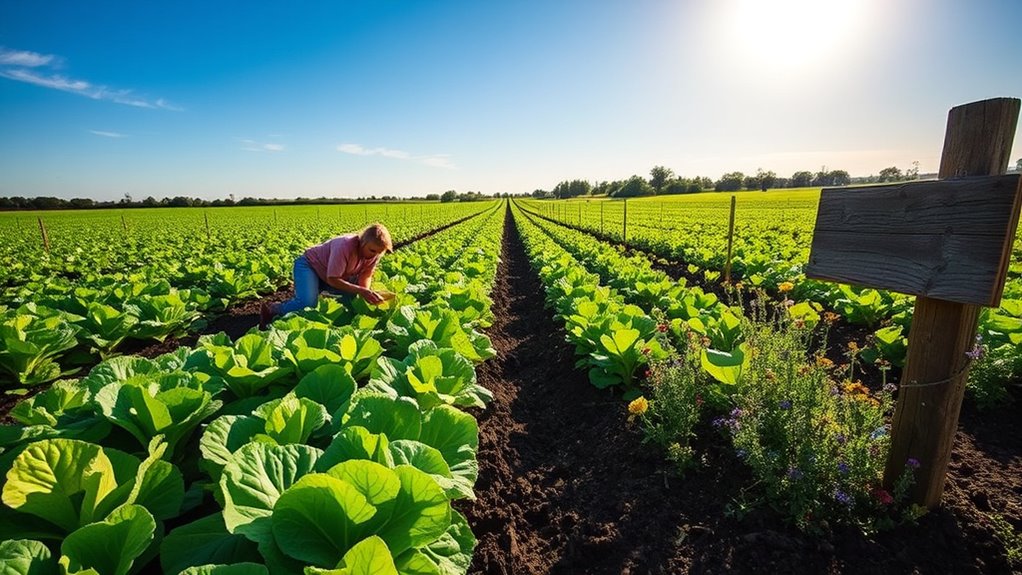
Organic farming is an innovative agricultural system that prioritizes naturally occurring inputs while banning synthetic chemicals, genetically modified organisms (GMOs), and growth hormones.
This approach emphasizes environmental health by combining biodiversity with sustainable practices, preserving natural resources for future generations.
You'll find that organic farming applies to various product categories, including unprocessed items like fruits and vegetables, as well as processed goods like cheese.
To ensure quality, farmers must undergo a rigorous certification process, adhering to strict standards and regular audits.
Globally, organic agriculture spans over 70 million hectares, with significant growth in regions such as Australia.
Principles of Organic Farming

At the heart of organic farming lies a commitment to sustainable practices that nurture the interconnectedness of soil, plants, animals, and humans.
You focus on the Principle of Health, enhancing the well-being of all living systems. The Principle of Ecology guides you to work with nature, promoting biodiversity and ecological balance. Fairness ensures your practices support equitable relationships, while Care emphasizes responsible management for future generations.
Embracing health, ecology, fairness, and care, organic farming nurtures living systems and fosters sustainable relationships with nature and communities.
You also adhere to strict certification standards to maintain compliance with these principles. By conserving soil, ensuring animal welfare, and engaging local communities, you create a farming system that values health, equity, and environmental conservation.
Organic farming isn't just a method; it's a holistic approach that connects you deeply with nature and your community.
Methods and Techniques Used in Organic Farming
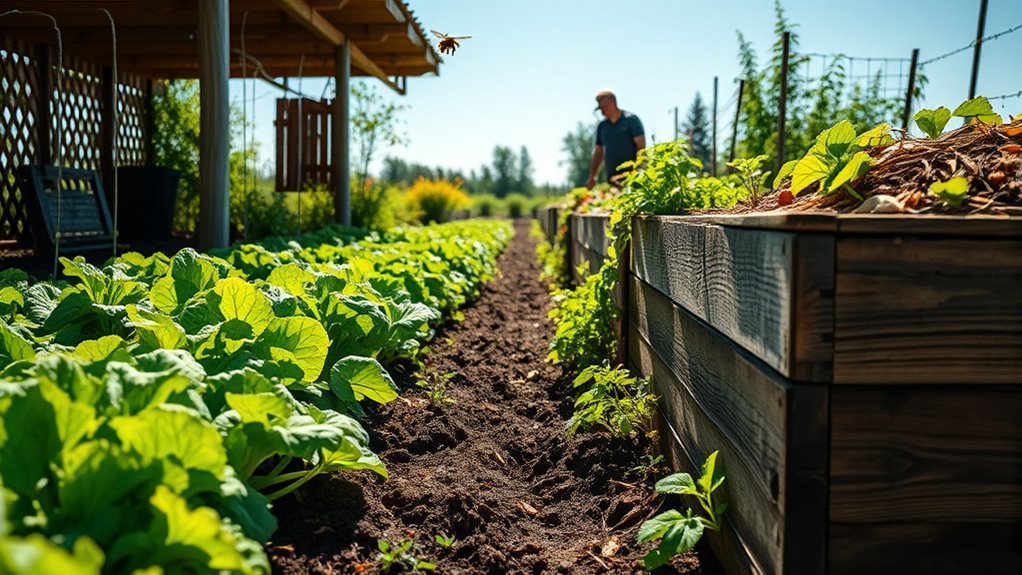
Building on the principles of organic farming, the methods and techniques used in this approach emphasize a holistic relationship with the environment.
You can manage soil health through practices like crop rotation, green manures, and composting, which enrich the earth while preventing erosion.
For pest and weed control, integrate biological methods like encouraging natural predators and manual weeding, along with mulching to suppress unwanted growth.
In livestock management, rotational grazing and organic feed ensure healthy animals without synthetic additives.
Emphasizing crop diversity through polyculture and intercropping enhances resilience against pests.
By utilizing natural fertilizers and organic seeds, you nurture the ecosystem while maintaining productivity.
Each method is designed to work in harmony with nature, promoting sustainability.
Environmental Impact of Organic Farming
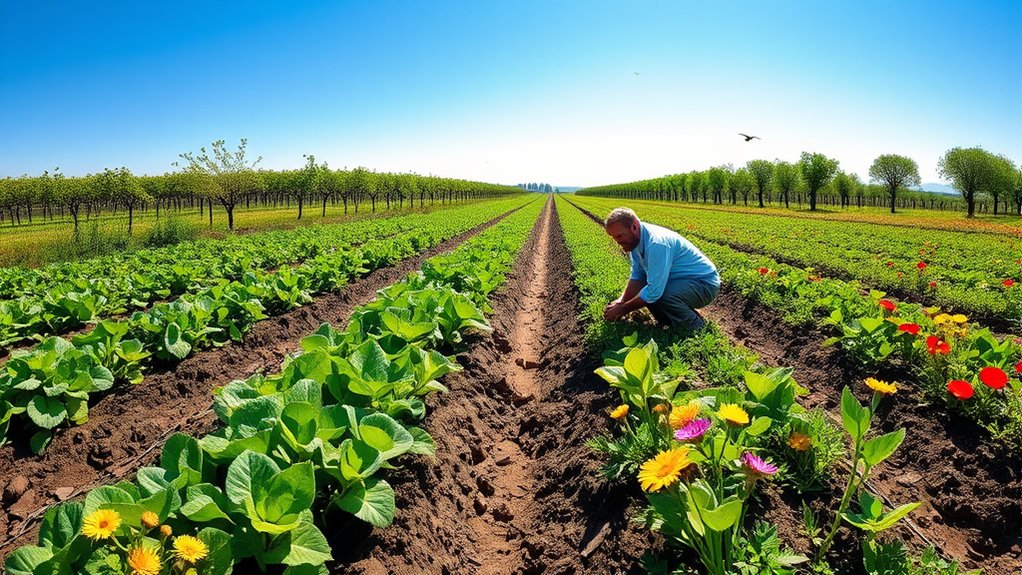
The environmental impact of organic farming is significant, offering numerous benefits that promote sustainability and ecological balance.
You'll find that organic farming reduces greenhouse gas emissions by limiting chemical fertilizers, helping to mitigate climate change. By avoiding synthetic pesticides and fertilizers, it lowers the risk of pollution in soils and waterways, protecting vital ecosystems.
Organic farms also capture more carbon, enhancing long-term soil health. Additionally, these practices maintain biodiversity by fostering natural pest control and supporting various plant and animal species.
Organic farming boosts carbon capture and soil health while promoting biodiversity through natural pest control and diverse ecosystems.
With efficient resource use, organic methods minimize waste and reliance on imports, while promoting renewable resources.
Ultimately, organic farming contributes to a healthier planet, making it a powerful choice for environmentally conscious consumers.
Economic Benefits of Organic Farming
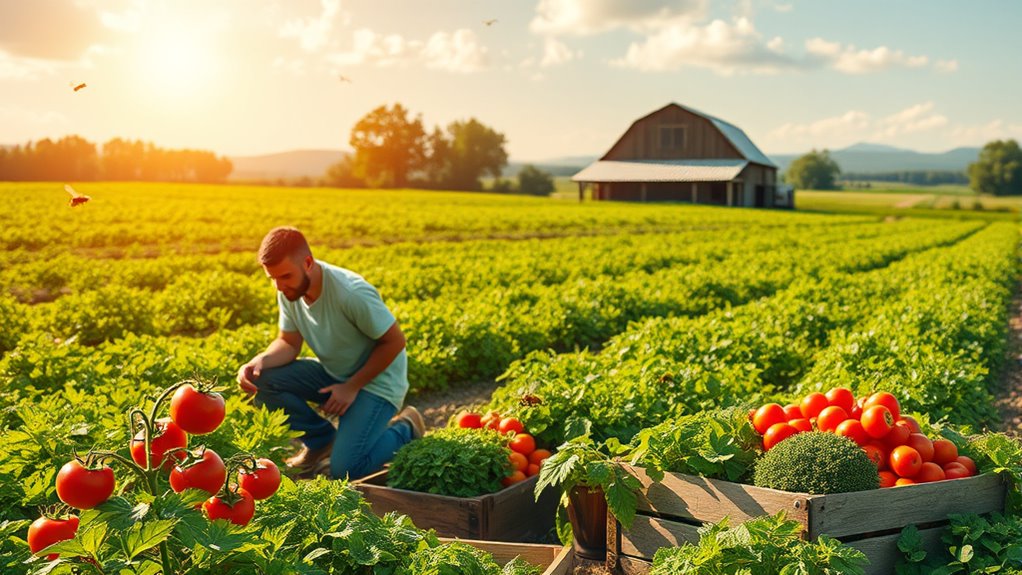
While many people might assume that organic farming is less profitable than conventional methods, it often proves to be equally or even more lucrative.
Organic farms can benefit from premium prices, making higher profits per unit area possible. Studies show that after a transition, organic systems yield up to 95% of conventional yields.
Plus, by reducing reliance on costly inputs like fossil fuels, you decrease vulnerability to market fluctuations. The growth of the organic food market underscores consumer demand, with U.S. sales skyrocketing from $1 billion in 1990 to over $20 billion by 2007.
Ultimately, organic farming not only enhances financial stability but also fosters local economic development, making it a smart choice for sustainable agriculture.
Social Benefits of Organic Farming
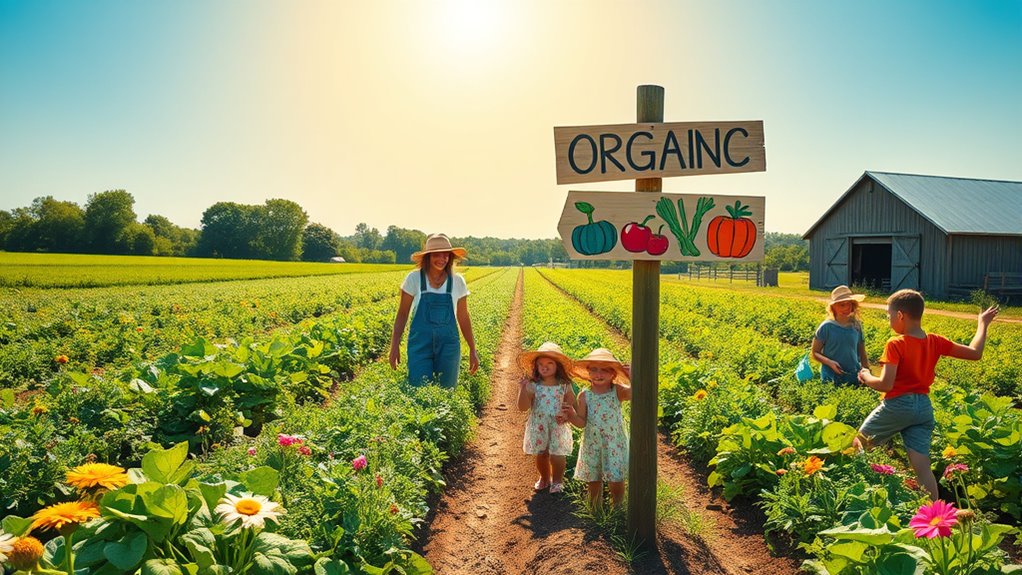
Organic farming not only offers economic advantages but also brings significant social benefits that positively impact communities and individuals involved in the sector.
It enhances social sustainability by improving working conditions for farmers, who often prefer this method due to its health benefits. By fostering community involvement, organic farming diversifies local economies and strengthens social cohesion.
You'll notice improved livelihoods for farmers and their families while maintaining cultural heritage and traditional practices. Additionally, the reduced exposure to harmful chemicals promotes better mental and physical health among workers.
As consumers support organic products for their environmental and social benefits, you contribute to a more equitable distribution of resources, ensuring fair labor practices within your community.
Certification and Regulation in Organic Farming
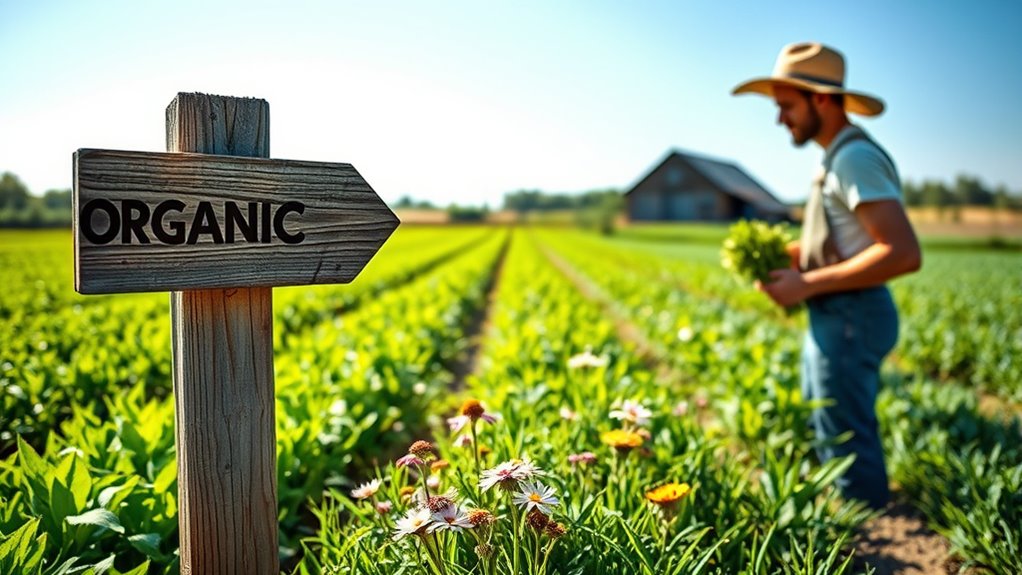
To ensure that products meet specific organic standards, farmers must navigate a rigorous certification process. This involves developing an organic system plan, implementing it, and undergoing annual inspections to maintain certification.
Certifying agents, accredited by the USDA, review inspection reports to make certification decisions. You'll face varying costs based on your operation size, but cost-share programs can reimburse up to 75% of these expenses.
The USDA Organic Regulations prohibit synthetic pesticides, herbicides, and GMOs, requiring land to be free of such substances for at least three years prior to certification.
Regular compliance checks ensure adherence to these standards, enhancing consumer trust and allowing certified products to command premium prices in the market.
Global Presence and Trends in Organic Farming
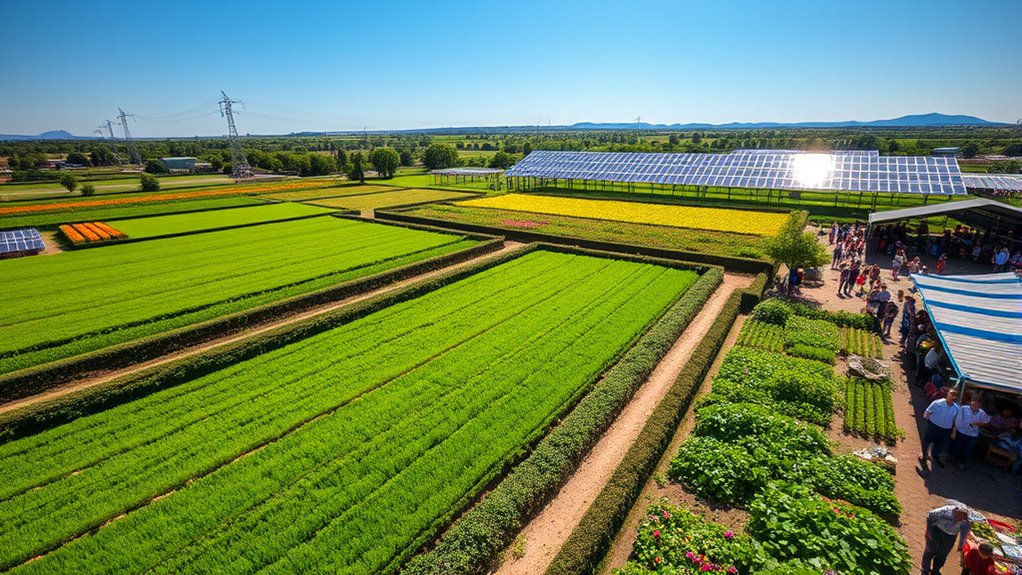
As the certification process for organic farming strengthens consumer trust, the global landscape of organic agriculture is rapidly expanding.
In 2023, organic farmland grew by 2.6%, reaching almost 99 million hectares, which now accounts for 2.1% of all agricultural land. Latin America led this growth, adding 1 million hectares, while Africa recorded an impressive 24% increase.
Oceania remains dominant, with Australia owning 53 million hectares. The global market for organic products hit €136.4 billion, with the U.S. being the largest consumer.
Challenges like bureaucratic hurdles persist, yet demand keeps rising, especially in Europe and Africa. You'll find organic farming practiced across 188 countries, showcasing its diverse and dynamic presence worldwide.
Frequently Asked Questions
How Does Organic Farming Affect Local Wildlife Populations?
Organic farming positively affects local wildlife populations by creating healthier ecosystems.
You'll notice more bird species and beneficial insects on organic farms, thanks to the absence of synthetic pesticides.
By using practices like crop rotation and maintaining hedgerows, you promote diverse habitats that support various wildlife.
The healthier soil and natural pest control methods enhance the overall biodiversity, making organic farms vital sanctuaries for local species and contributing to long-term ecological balance.
What Are Common Misconceptions About Organic Farming?
You might think organic farming means no pesticides, but it actually allows natural ones.
Many believe organic food is significantly more nutritious, though the difference isn't always clear.
Some people assume organic farming is always better for the environment, but it can require more land.
Finally, you may think organic products are always cheaper, but they often come with higher production costs.
Understanding these misconceptions helps clarify what organic farming truly involves.
Can Organic Farming Be Practiced in Urban Areas?
Absolutely, you can practice organic farming in urban areas!
In fact, a study found that urban farms can produce up to 15 times more food per square foot than traditional farms. By utilizing rooftops or vacant lots, you can cultivate fresh, healthy produce right where you live.
Plus, you're reducing transportation emissions and fostering community connections.
What Challenges Do Organic Farmers Face Today?
You face numerous challenges as an organic farmer today.
Regulatory changes demand quick adaptations, and the costs of certification can rise unexpectedly.
Additionally, maintaining soil health and managing pests without synthetic chemicals complicate your efforts.
Economic hurdles, like higher input costs and limited market access, further strain your finances.
Plus, you must navigate trade restrictions and fluctuating government support, all while striving to create sustainable and resilient farming practices.
How Does Organic Farming Impact Community Health?
Organic farming impacts community health by reducing exposure to harmful chemicals, promoting nutrient-dense foods, and supporting local economies.
You'll notice that organic produce often contains more vitamins and antioxidants, enhancing your overall nutrition.
Plus, these practices help maintain healthy ecosystems, which are vital for your community's well-being.
Conclusion
In the garden of agriculture, organic farming blooms like a vibrant wildflower, fostering health for both the planet and its people. By embracing its principles, you're not just nurturing crops; you're cultivating a sustainable future. The methods you choose can enrich the soil, enhance your local economy, and build stronger communities. As you explore organic practices, remember that every seed you plant today can grow into a healthier tomorrow for generations to come.

